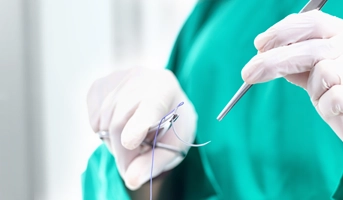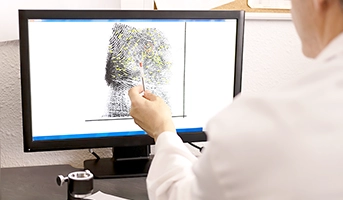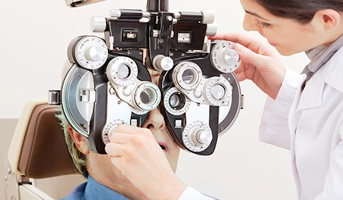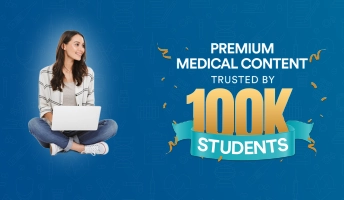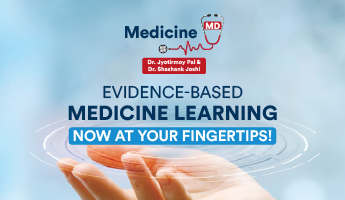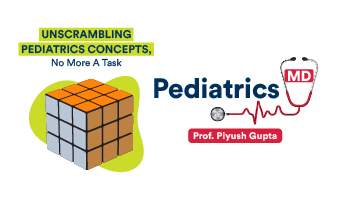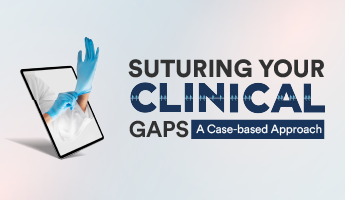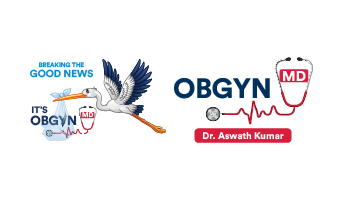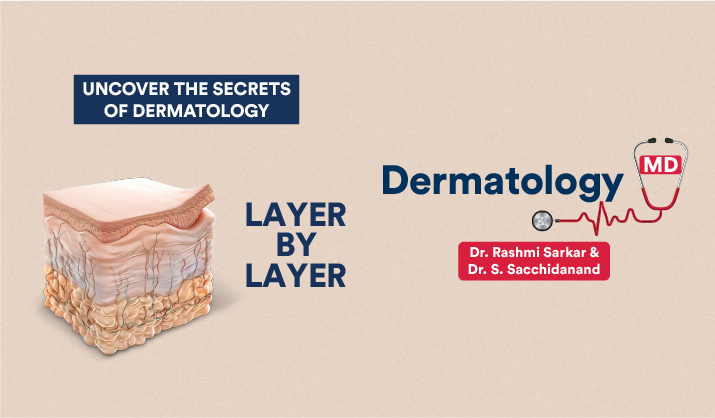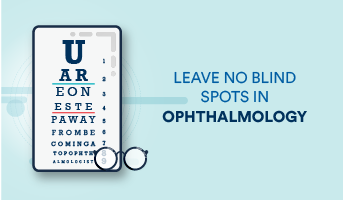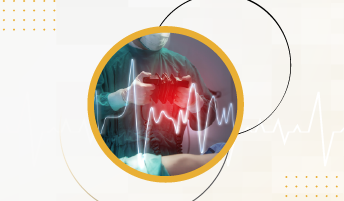The field of Ophthalmology focuses on conditions affecting the eyes. A medical professional will have the chance to be at the forefront of patient care by choosing to become an ophthalmologist. One is involved in all phases of illness diagnosis and treatment.
Ophthalmologist Career Path
A medical student needs to follow the below-mentioned procedure to become a top Ophthalmologist:
- Crack NEET-UG entrance exam with competitive score to get admission into the MBBS course.
- Complete the undergraduate medical course- MBBS with an impressive Grade Point Average (GPA).
- Prepare and crack the NEET-PG entrance exam with competitive score to get admission in the MD/MS Ophthalmology specialty.
- Complete a post-graduation degree in Ophthalmology.
- Complete your residency program, gain experience and get licensed.
- Further, there are options to pursue super-specialization or research.
Only by fulfilling these requirements can one become an ophthalmologist; nonetheless, a medical student’s knowledge and abilities will determine whether or not they become a renowned ophthalmologist. From the time one enrols for the MBBS course, to the time one starts preparing for MD entrance, and finally doing a master’s and acquiring the MD degree in Ophthalmology, one needs to possess clarity in concepts. They must possess in-depth knowledge of the practical ramifications of eye diseases and disorders, as well as a comprehensive vocabulary of the pharmaceuticals, modern equipment, techniques, and procedures linked to eye diagnosis, treatment, and surgery.
Ophthalmology in MBBS
MBBS students who study ophthalmology are given an overview of the anatomy and physiology of parts, which they may quickly recall. Additionally, a thorough understanding of how each ailment would manifest during an optical examination can help them in understanding the aetiology of various diseases. Students gain a thorough understanding through basic history-taking and clinical eye examinations. The study of ophthalmology for MBBS students places a strong emphasis on clinical learning while also preparing students for theory, practical, and NEET PG exams.
Ophthalmology prof exam consists of a 100-mark theory exam and a 100-mark practical/oral examination, under the revised CBME curriculum. Structured essays (long answer questions), short response questions, and objective questions are among the kind of questions asked in the theoretical test (MCQs and IBQs).
Post-Graduation in Ophthalmology
Students enrol in a 3-year PG Ophthalmology programme after earning their MBBS degree. This training helps students get ready to deal with eye conditions like glaucoma, which damages the optic nerve and impairs vision with a danger of going blind, iritis, an iris inflammation that may be brought on by a systemic disease, chemical burns, and orbital cellulite. The further education and training available to enrolled students span a wide range of subspecialties, from critical eye surgery to dispensing glasses and contact lenses. The well-designed training can assist doctors in treating any future eye issues.
The course covers the fundamentals of ophthalmology in addition to more complex topics such as concerns with the optical nerve system and problems with the uvea and vitreoretinal tissues. According to analyses gathered through the use of medicine, surgery, diet, and other therapies, postgrads are taught how to treat eyes. In order to provide comprehensive eye care, which includes vision services, eye exams, medical and surgical eye treatments, and the identification and treatment of eye conditions and other visual impairments, the curriculum is created to equip medical students with the knowledge and skills they need.
Additional Training for Ophthalmologists
But being an ophthalmologist doesn’t end with getting an MD in the field. A medical student needs to have a few prerequisite skills in order to finish the PG Ophthalmology course effectively. A person is qualified for an Ophthalmology MD if they possess excellent administrative skills, a foundation in math and physics, are open to receiving specialised training in eye care, and have the capacity to master the topics and ideas covered in the course.
If medical students wish to work in hospitals, NGOs, the Indian army, or health research labs, they can pick extra training or education, such as a PhD that is relevant to the Ophthalmology admission exam for the state or provincial service commission. In addition to working as a senior ENT consultant, lecturer, professor, eye product specialist, or medical consultant, an ophthalmologist may choose to do so as well. If a medical student passes the MD entrance exam with at least 55% of the requisite marks, whichever is higher, they may choose ophthalmology as a speciality subject. Only a few of the Ophthalmology specialisations are Applied Basic Sciences, Clinical Ophthalmology with Refraction, Recent Advances in Therapeutic Procedures, Clinical Ophthalmology and Surgical Procedures, and Community Ophthalmology with scopes for Rehabilitation.
Online Ophthalmology Courses
Online courses in ophthalmology are extremely beneficial for aspiring ophthalmologists. Online ophthalmology courses go into great detail about both common and uncommon eye conditions, including glaucoma, iritis, chemical burns to the eye, eyebrow, and face, trauma to the eye, tumours in the eye, crossed eyes, retinopathy, optic neuritis, etc.
For a variety of reasons, prospective ophthalmologists favour online ophthalmology MD courses. Every chapter of the Ophthalmology specialisation is crucial, therefore, a student can benefit from additional help in the form of an online course with video lectures. A student can hence learn from such video lectures while on the bus, in the library, at home, or at a friend’s house. The ability to study ophthalmology at one’s own pace is helpful to the student. One benefits from these lessons throughout their professional career. However, a medical student must enrol in one of the best online ophthalmology courses that has rich, top-notch content that can help brush up on information and improve abilities in order to fully benefit from an online Ophthalmology MD course.
A select few medical education platforms provide top online Ophthalmology courses for MBBS students. Ophthalmology for UnderGrads by DigiNerve has been designed and developed in accordance with the new CBME curriculum. It is the best online ophthalmology course because it also specifies the tools that will be more useful while studying a specific subject or competency. The training is designed for medical undergrads and helps them be ready for PG entrance tests as well as university exams. Dr. Parul Ichhpujani and Dr. Talvir Sidhu, who have covered all the crucial components of the subject, have served as its mentors. Students can increase their knowledge of the subject’s fundamentals, which have been connected to clinical cases and clinical vignettes, by taking this online ophthalmology course. This will give the topic a clinical orientation.
For postgrads, the best Ophthalmology PG courses prove to be highly beneficial. An online PG ophthalmology course like Ophthalmology MD by N. Venkatesh Prajna can assist a student in developing greater confidence and knowledge in the field of ophthalmology by providing rich, in-depth illustrations of the various parts of the eye, life-like models, clear insights into surgical procedures, practical tips for a variety of surgical situations, and, most importantly, guidance from India’s most coveted faculty who are themselves renowned ophthalmologists with years of experience. The course’s components are tailored to the needs of the students’ pre-operative workup, assisting them in performing surgical skills and even managing post-operative challenges. It encourages concept- and approach-based learning in order to satisfy all of the students’ learning requirements. Practitioners could also enhance clinical/surgical ophthalmic skills by using surgical movies along with 3D animated sequences of every surgical phase.
Job Profile
The treatment of traumatic eye injuries, the diagnosis of eye conditions, and the issuance of prescriptions are all responsibilities of ophthalmologists. Their duties might be straightforward, like writing prescriptions for corrective glasses, or extremely complex, like performing keyhole or laser surgery. A pediatric ophthalmologist, for example, specialises in treating children’s eyes. Ophthalmologists can choose to specialise in a particular field of eye care.
You must be willing to stay abreast with eye disorders, conditions, and anatomy in order to practise ophthalmology successfully. You need to be extremely steady-handed, analytical, and careful.
Responsibilities of an Ophthalmologist:
- Executing standard medical procedures such as eye exams, glasses, and contact lens prescriptions.
- Carrying out remedial procedures, such as treating cataracts and treating corneal damage.
- Performing cutting-edge surgical treatments like laser or keyhole surgery.
- Identifying and treating eye conditions and wounds.
- Managing outpatient clinics, specialty eye clinics, or emergency eye clinics.
- Using a holistic approach to treat medical conditions that have an impact on eyesight.
- Conducting biopsies and therapeutic procedures.
Requirements from an Ophthalmologist:
- An ophthalmology-related medical degree.
- Successful completion of an ophthalmology residency and internship.
- A state-issued ophthalmology licence.
- In-depth understanding of the anatomy, disorders, and functioning of the eye.
- Outstanding medical knowledge as well as strong math and physics abilities.
- Strong managerial and administrative abilities.
- Solid eye-hand coordination.
- Excellent planning, communication, problem-solving, and judgement abilities.
Salary of Ophthalmologists
Ophthalmology is a specialised area of medicine with a wide range of employment opportunities. Ophthalmologists can find employment in NGOs, government and private hospitals, and departments of health. The average yearly income for ophthalmologists in India is 10 Lakhs, with salaries ranging from 9 Lakhs to 30 Lakhs.
Scope of Ophthalmology
An ophthalmologist can better manage patients when they have in-depth knowledge and are skilled in both theory and practice. It is common for a top ophthalmologist to build an international network and meet renowned colleagues who will advance the field of ophthalmology. A top ophthalmologist’s efforts are always recognised and valued across the medical horizon.
After completing coursework in this area, job prospects can be found in a variety of settings, including hospitals administered by the public or private sectors, clinics, healthcare facilities, NGOs, missionary and charitable hospitals, and many more.
Many hospitals, clinics, and medical offices employ ophthalmologists. They can work in private offices as well, although ophthalmic technologists are employed by hospitals. The ophthalmic specialist may have a particular field of expertise, such as low-vision optics, aiding during eye surgery, ophthalmic ultrasonography, or ophthalmic photography.
As skilled and knowledgeable ophthalmologists, you can open your own practice for higher profits. Additionally, numerous schools and universities may choose to hire you as a professor or lecturer. You can enlist as an ophthalmologist in the army, air force, or navy.
One can choose a career as:
- Ophthalmologist
- Ophthalmology Surgeon
- Professor/Lecturer
- Clinical Assistant
- Medical Consultant
Ophthalmology is a branch of medicine dealing with the diagnosis and treatment of disorders and diseases of the eye. The subject includes surgical procedures and medical treatment. Ophthalmology for UnderGrads might not be as vast as medicine or surgery subjects, but it holds great significance and hence, a medico must have a strong foundation in the subject. Medical students must be well-versed in the anatomy and physiology of the eye along with the diseases.
High-yielding topics are a crucial component of an efficient study plan that will help you perform well on tests. A medico must strategically arrange their preparation, emphasizing time management, high-yielding topics from each subject, and, most importantly, their health.
MBBS Prof Exam Pattern
According to the new CBME curriculum, the ophthalmology prof exam comprises 100 marks theory exam and 100 marks practical/oral examination. The types of questions asked in the theoretical test include structured essays (long answer questions), short response questions, and objective questions (MCQs and IBQs).
Important topics of Ophthalmology for MBBS Prof Exams, NEET-PG and INI-CET
If you want to pursue higher education, you should concentrate on early preparation for both regular examinations and competitive tests during MBBS. Currently, India has two major exams: one is NEET PG/NExT Exam and the other is INI-CET Exam. The weightage of Ophthalmology is around 6-8 questions in INI-CET and 10 questions in NEET PG.
Here’s a list of important topics of Ophthalmology for MBBS prof exams, NEET-PG, and INI-CET entrance examinations.
- Lens: Anatomy and Physiology of lens
- Cataract: Define, Etiology, Management
- Cataract Surgeries, their procedure, and complications
- ECCE
- Phacoemulsification and SICS
- ICCE
- ICCE vs ECCE
- Types of Cataracts:
- Developmental/Congenital
- Senile Cataract
- Coronary
- Traumatic
- Hypermature
- Complicated
- Hypopyon corneal ulcer
- Mycotic corneal ulcer
- Corneal ulcer
- Corneal opacities
- Congenital abnormalities of the Cornea
- Cornea degeneration
- Vision Assessment
- Strabismus to Amblyopia
- Chalazion
- Orbital Cellulitis
- Cavernous Sinus Thrombosis
- Hypermetropia
- Myopia
- Scleritis and Episcleritis
- Hypertensive & Diabetic Retinopathy
- Red eye
- Anterior uveitis
- Festooned pupil
- Hyphema – Causes, C/F, Rx
- Glaucoma:
- Define and classification
- Glaucoma- POAG, PACG
- Open-angle glaucoma- define, C/F, Rx, Field changes
- Angle-closure glaucoma- define, etiopathogenesis, C/F, Rx
- Anti-glaucoma drugs
- Drugs:
- Pilocarpine
- Timolol
- Atropine
- Acyclovir
- Cyclopentolate
- Vitamin A
- Vision 2020
- Causes- Sudden loss of vision
- Retina: CRVO, CRAO, CME, CSR
- Retinoscopy
- Retinal detachment
- Proliferative diabetic retinopathy
- Ophthalmoscope
- Dry eye
- Penetrating keratoplasty
- Keratitis
- Bacterial conjunctivitis
- Allergic conjunctivitis-full
- Xerophthalmia
- Phlyctenular Keratoconjunctivitis
- Pterygium – detection, types, C/F, Management
- Trachoma
- Anterior uveitis
- Epiphora
- Chronic dacryocystitis
- Acute dacryocystitis
- Congenital dacryocystitis
- Optics
- Types of refractive errors
- Neuro-Ophthalmology
- Toxic Amblyopia
- Optic neuritis
- Squint: Paralytic squint, Concomitant squint
- White pupillary reflex
- Blowout fracture of the orbit
- Thyroid eye disease
- Blunt injury of the eye – Ocular trauma, classification, and management
- NBCP
All the aforementioned are NEET PG 2023 high-yield topics and are regularly asked in MBBS professional exams. Avoid skipping these crucial topics if you want to perform well in your tests.
Ophthalmology for UnderGrads is one of the best online ophthalmology courses to supplement your studies and NEET PG preparation. The course is designed according to the CBME curriculum and is taught by renowned professors, Dr. Parul Ichhpujani and Dr. Talvir Sidhu. This online course offers highly illustrative video lectures, case studies, notes, clinical cases and 1000+ self-assessment questions. The video lectures are profusely illustrated with clinical and radiological images along with tables and flowcharts. The lectures use the revolutionary CBME methodology, which guarantees intellectual clarity and excellent results in the prof exams and entrance exams. The course covers a detailed explanation of the disease pathogenesis and ocular examination.
Check out 2 Months strategy to crack NEET PG 2023: https://www.diginerve.com/tips-on-how-to-crack-neet-pg-in-2-months/
Click here to know the important topics of Microbiology for NEET-PG.
Click here to know the important topics of Community Medicine for NEET-PG.
Click here to know the important topics of Pharmacology for NEET-PG.
Frequently Asked Questions (FAQs)
Q 1. How to learn Ophthalmology for MBBS online?
Ans. Ophthalmology for Undergrads, taught by famous professors Dr. Parul Ichhpujani and Dr. Talvir Sidhu, is one of the best online ophthalmology courses to supplement your studies and NEET PG preparation. The highly illustrative video lectures, case studies, notes, and self-assessment questions are included in this online course. The unique CBME methodology used in the course ensures intellectual clarity and superior performance in the prof examination as well as entrance examinations.
Q2. Which is the recommended book for Ophthalmology for MBBS students?
Ans. Clinical Cases in Glaucoma: An Evidence-Based Approach by Parul Ichhpujani & Shibal Bhartiya, Expert Techniques in Ophthalmic Surgery by Parul Ichhpujani, George L. Spaeth & Myron Yanoff and Gonioscopy: A Video-Assisted Skill Transfer Approach by Talvir Sidhu, Tanuj Dada, Amit Kumar & Ajay Sharma are some of the recommended books for Ophthalmology.
Q3. Is Ophthalmology important for NEET PG?
Ans. Yes, Ophthalmology is a scoring subject and has a weightage of around 10 questions in NEET PG Exam 2023.
Q4. What are the important topics of ophthalmology?
Ans. The important topics of Ophthalmology include the Anatomy and Physiology of lens, Cataract Surgeries, Retinoscopy, Retinal detachment, Proliferative diabetic retinopathy, Ophthalmoscope, Red eye, Penetrating keratoplasty, Uveitis, Cornea degeneration, Vision Assessment, Strabismus to Amblyopia, Chalazion, Orbital Cellulitis, Cavernous Sinus Thrombosis, Hypermetropia, White pupillary reflex, Blowout fracture of the orbit, Thyroid eye disease, and more.
Ophthalmology is a medical specialty that focuses on the diagnosis and treatment of eye diseases and their complications. Ophthalmology, once considered a minor discipline, has recently expanded to include a variety of subspecialties such as the cornea, pediatric ophthalmology, ocular oncology, glaucoma, ocular pathology, and neuro-ophthalmology.
Studying ophthalmology according to the previous syllabus made it difficult for students to figure out which topics they should emphasize more, how to organize their studies, what practical aspects/skills to know and acquire, and so on. The new CBME Curriculum focuses on core competencies and outlines the learning domain as well as the depth to which a concept should be explored. The AETCOM Module, which stands for Attitude Ethics and Communication, defines the competencies on which the curriculum is built. This is in place to ensure that graduates have the skills they need to meet patients’ needs in society.
DigiNerve’s Ophthalmology for UnderGrads has been conceptualized and designed in accordance with the new CBME curriculum. The aim is to help MBBS students get conceptual clarity and farewell in university exams as well as PG entrance exams. Dr. Parul Ichhpujani and Dr. Talvir Sidhu, the eminent faculty for this course, have addressed all of the subject’s essential aspects in their CBME-oriented Ophthalmology Course. This is one of the best online ophthalmology courses since it aims to provide students with specific competencies more effectively.
Some of the major books authored by Dr. Parul Ichhpujani are “Expert Techniques in Ophthalmic Surgery”, “Clinical Cases in Glaucoma: An Evidence-Based Approach”, and “Manual of Glaucoma”, while Dr. Talvir Sidhu is renowned for her book “Gonioscopy: A Text and Atlas” and “Gonioscopy: A video-assisted Skill Transfer Approach” (includes interactive DVD-ROM).
The faculty has covered the art of studying ophthalmology in order to prepare students for theory, practical, and NEET PG examinations. The orientation video itself provides them with a road map to approach the subject. This online ophthalmology course is designed to help MBBS students in strengthening the basics of Ophthalmology by providing them with advanced clinical vignettes. This provides clinical orientation to the subject.
Each topic includes an overview of the anatomy and physiology of that part, which will serve as a refresher for students. It will also assist them in comprehending the aetiology of various disorders, as well as providing a full description of how each ailment would manifest on ocular inspection. In this Online Ophthalmology Course, basic history-taking and clinical examination of the eye are demonstrated as an extended lecture to provide students with a full overview. The lectures are well-illustrated with clinical and radiological pictures, as well as flowcharts, tables, and boxes to enhance the visual memory of the students.
The Course Includes:
- Video Lectures: 21+ hrs of video lecture series that give you an edge over others.
- Lecture Notes: 33 lecture notes including simple advanced-case vignettes to enhance knowledge during preparation.
- Clinical Case-Based Discussion: The course includes various practical case scenarios which are usually not given in textbooks.
- Self-Assessment Questions: 1000+ practice questions are provided with relevant explanations
DigiNerve’s Ophthalmology for UnderGrads- Table of Content
Ocular Examination
Basic History And Ocular Examination
Visual acuity
Vision assessment
Refractive Errors
Extraocular muscles and Ocular motility
Strabismus to Amblyopia
Extraocular Muscles -Strabismus
Nerve Palsies
Lids and Adnexa
Lid and Adnexal Disorders-1
Lid and Adnexal Disorders-2
Orbit
Proptosis, Orbital Cellulitis and Cavernous Sinus Thrombosis
Orbital Tumors
Conjunctiva
Red Eye by
Conjunctival Disorders
Cornea
Corneal Ulcer: Bacterial and Fungal
Corneal Ulcer: Viral
Eye donation and Eye banking
Sclera
Scleritis and Episcleritis
Anterior chamber and Uvea
Anterior Chamber
Uveitis
Primary Open Angle Glaucoma
Lens
Anatomy and Physiology
Cataract: History, Examination and Consent
Cataract: Diagnosis & Planning Surgery
Cataract Surgeries
Retina
Basics of Fundus Examination
Vascular Occlusions of Retina
Hypertensive & Diabetic Retinopathy
Retinal Detachment by
Management Modalities for Retinal Disorders
Optic Nerve
Diseases of Optic Nerve
Miscellaneous
National Programme for Control of Blindness and Visual Impairment (NPCB & VI) and Vision 2020
Ocular Trauma
Visual Rehabilitation in the Elderly
How to Study Ophthalmology?
Study from Reliable Resources: The new CBME curriculum stresses key competencies and outlines the learning domain as well as the level at which a subject must be learned. As a result, students must concentrate on locating the most relevant and reliable content which is as per the latest curriculum.
Watch Clinical Case Discussions: The online Ophthalmology course on DigiNerve is ideal for gaining conceptual clarity through clinical case discussions. This course was designed and developed in accordance with the new CBME curriculum. It comprises an extended presentation that includes a demonstration of basic history-taking and clinical examination of the eye to provide students with a full overview.
Practise from Exam POV: To receive maximum exposure for your university exams and NEET PG Exam, practise as many questions as possible.
Learn from best mentors: Find popular study resources by specialists who cover the art of studying ophthalmology as well as content as per theory, practical, and NEET PG exams. It’s helpful if your professor provides you with a strategy for approaching the subject.
Study Ocular Examination in depth: In each chapter, focus on anatomy and physiology, as well as the pathophysiology of various diseases, and a full explanation of how each condition would appear on the ocular examination. To strengthen your memory, look for clinical and radiological images, as well as flowcharts, tables, and boxes, wherever they are needed.
How to Study Ophthalmology for NEET PG?
When preparing for NEET-PG, it is essential to study from the appropriate books. Students are frequently enticed by texts that promise shortcuts. As the candidate approaches the subject, such books have a negative impact on their psychology. Therefore, referring to recommended books is critical, as these books help students to dodge doubts.
Some of the most important topics in Ophthalmology are:
- Lens – Surgeries, Ectopia lentis, Cataract, and related concepts, their complications, and solutions are very important. You should also be well-versed in the Anatomy and Physiology of lens.
- Cornea – Anatomy and Physiology, Keratitis, Congenital Anomalies of Cornea, and Cornea Degeneration
- Conjunctiva – Conjunctivitis, Trachoma, Vernal Keratoconjunctivitis, Phlyctenular Conjunctivitis, Dry Eye, Pterygium, and Pinguecula.
- Glaucoma – POAG, PACG, Secondary Glaucoma, and Surgeries and Drugs
- Orbit – Blunt Trauma, Orbit Fracture, Orbit Tumors, Proptosis, and Chalcosis
- Eye – Surgeries, and Ptosis (Measurement and Causes)
- Lacrimal – Epiphora, and Dacryocystitis Treatment
- Retina – CRVO, CRAO, CME, CSR, Diabetic Retinopathy, ARMD, Retinoblastoma, Retinitis Pigmentosa, BEST, Stargardt Disease, Coats Disease, Retinoscopy, Ophthalmoscope, and ROP
- Optics – Criteria, Definitions and Types of Refractive Error, Surgeries, and Contact Lens
- Neuro-Ophthalmology – Pathway, Reflex, Papillitis, Papilledema, Toxic Amblyopia, Squint, and Optic Neuritis
- Community Ophthalmology – NBCP & Xerophthalmia
Scope of Studying Ophthalmology
- Cataract Specialists or Surgeons: These are professionals who perform surgery to remove the natural lens and replace it with an artificial lens in order to alleviate the patient’s problem of opacity or blurred vision.
- Neuro-Ophthalmology Specialist: An expert in this profession deals with eye disorders related to the neurological system. Some serious concerns, such as optic nerve abnormalities impacting visibility, trouble controlling eye movement, double vision, and so on, require rapid treatment from a Neuro-Ophthalmologist. A specialist who is a master of Ophthalmology is essential for the study of both neurology and ophthalmology.
- Retina Specialists: These professionals deal with issues affecting the Retina. These issues are usually caused by injury or damage to the retina, which can occur as a result of retinal detachment, abrupt flashes, or floaters.
- Cornea Specialist: This expert is responsible for providing treatments and surgeries to address any damage, illness, or disease that affects the human eye’s Cornea, Conjunctiva, Eyelids, and Sclera. They must take preventative actions to prevent additional harm and to recover the injury that is affecting the patient’s vision.
- Oculoplastics Specialists: They are specialists who work to repair and remodel the eye. They deal with eyelid surgery and abnormalities in the orbit and lacrimal system, as well as disorders in the area surrounding the eyeball.
- Pediatric Ophthalmologist: Professionals in this discipline deal with any ocular problem that affects children’s eyes. Strabismus, genetic abnormalities, amblyopia, neoplastic disorders, conjunctivitis, and misalignment of the eyes are some of the primary significant problems that Pediatric Ophthalmologists treat.
- Ocular Immunology Specialist: The specialist’s job is to control issues with the human body’s immunology, which can lead to a variety of eye-related illnesses and diseases. Corneal ulcers, uveitis, sclerosis, and any sort of eye inflammation are examples of these illnesses. These specialists collaborate closely with general practitioners.
Additional jobs to choose from are Professor/Lecturer, ENT Specialist, Clinical Assistant, and Medical Consultant.
FAQs
1 – What’s the difference between an optometrist and an ophthalmologist?
Patient’s eyes are examined, diagnosed, and treated by optometrists. Ophthalmologists are doctors who specialize in the medical and surgical treatment of eye diseases.
2 – Is being an ophthalmologist a good career choice?
Ophthalmology is a nice blend of surgical and medical practise, and many people can focus on either of these. Those interested in surgery will need time to adjust to this microsurgical field, but with the correct instruction, anyone with basic hand-eye coordination can master it.
3 – Does ophthalmology have any scope for the future?
According to the Health Resources and Services Administration, by 2025, there will be a demand for about 22,000 ophthalmic surgeons. However, it was predicted that more than 6,000 physicians would fall short of the requirement.
4 – Is ophthalmology a simple subject to learn?
It is regarded as one of the most difficult branches to study and practise, requiring complete dedication as well as knowledge and developed skills. This branch of medicine is characterized by a variety of extraordinary traits.
5 – How do I go about becoming an ophthalmologist after completing my MBBS?
One must first obtain an MBBS degree and then pursue post-graduate studies in Ophthalmology to become a competent Ophthalmologist.


